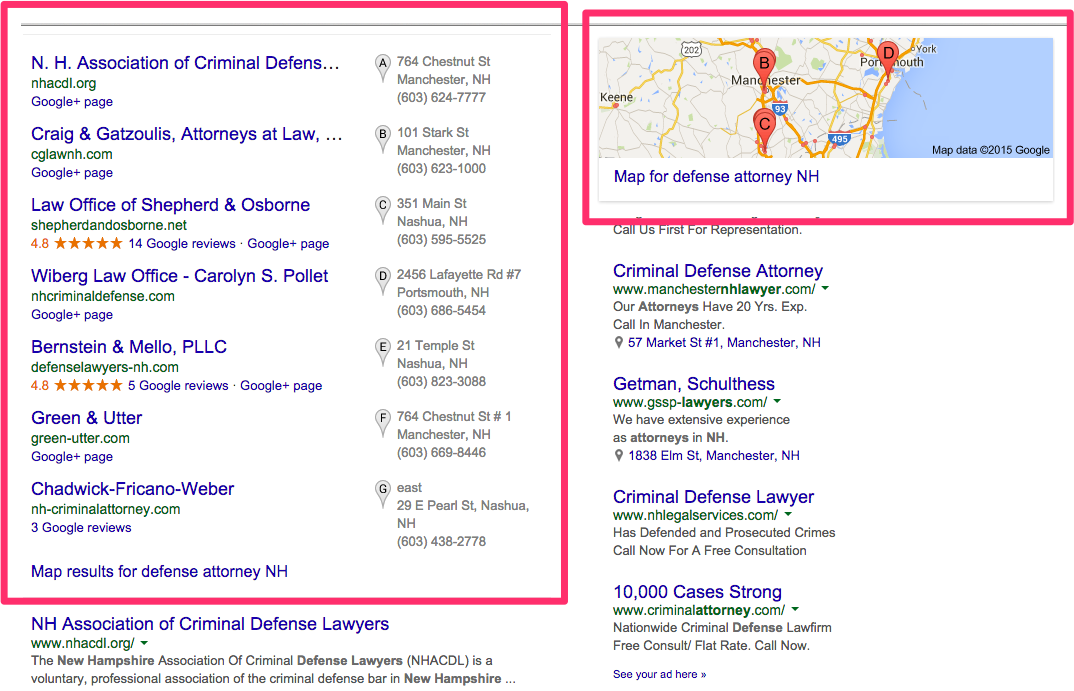
Let’s start with some very important information. Yes, it is VERY important. But I also have to qualify it because depending upon who did the survey, the numbers vary but the trend does not.
More and more people are going online first to find lawyers, not asking for recommendations first.
To be more clear, the number of people going online first rather than asking for a recommendation first from someone they trust is increasing. It is increasing primarily in the 18- 24 year old age group. Is it a far stretch to believe that more and more people in other age groups may be doing the same even if asking a trusted friend remains the primary way of finding a lawyer? And once they are online searching won’t they continue to do their research online before they decide who they are going to call?
Please take a moment and reread what I’ve written above. It’s very important you understand what is happening because only then will you start to look at your web presence (which includes everything about you already online, not just your website) differently and appreciate the importance of having a high quality, content rich law firm website fully optimized for mobile devices.
So, after searching high and low for a sponsor who gets how to create and optimize high quality law firm websites at reasonable prices, we’d like to introduce you to one of our newest sponsors, AmazeLaw.
Bryan Marble of AmazeLaw has shared some very valuable information about how websites really work today and I’m going to share with you in addition to some free or inexpensive tools to maximize your presence online.
FACT: 20-40% of website traffic to most law firms come from mobile devices.
And this number is only going to increase. In a world where we’re constantly moving from one device to another, it’s more important than ever to make sure that your website is optimized to look good on every screen size.
FACT: 40% of searchers will click another mobile result if a site’s not mobile friendly.
Why is the above fact important?
FACT: 70% of mobile searches result in action being taken within an hour as opposed to a week for desktop (Source: Mediative Labs 2012)
Google recommends the use of responsive design for your site as this usually provides the best user experience. Since Google needs to stay on top of the search engine heap, they want to provide users the best user experience so they will give search engine preference to sites that are optimized for mobile devices. Additionally, website load time is an increasing ranking factor in search results (again, related to user experience) so it’s important to have a mobile friendly site. You can even calculate how well Google ranks you for being mobile friendly.
Given that 20% to 40% of website traffic comes in from mobile devices, this means that if your site isn’t optimized for that experience, you could be losing almost half of your potential prospects.
After all, like a business person that shows up in a wrinkled suit 2 sizes too big, it’s hard to claim professional credibility when your website isn’t updated to match the times.
The Importance of Optimizing for Local Search
In the “old days” of 2013, search engine optimization was the holy grail, and for many attorneys it was an expensive and risky proposition given the amount of competition out there and the seediness of the vendors pitching their solutions.
Well, since then, Google has been focusing on the idea of local search. It’s their solution to the (now obvious) problem that when someone in Nashua is searching for a defense attorney, they don’t want the best defense attorney in the country, they want the best defense attorney in New Hampshire, and probably more specifically, in Nashua itself.
FACT: 53% of mobile searches have local intent (Source: Mediative Labs 2012)
— And it’s likely much higher when searching for attorneys as anything that looks like “[practice area] attorney” will probably trigger Google’s local search algorithm
So Google bypassed their normal search algorithm that most sites had been optimizing for, and instead took an entirely new path. They infer based on the searcher’s location and the content of their search whether someone is searching for something near them. Searching for resources on becoming a solo…probably not a local search. Looking for pizza, or ahem, an attorney, well that will trigger a local search.
And guess what?
Most attorneys haven’t spent much time optimizing for local search, but that’s to your advantage. It’s relatively simple to rank locally with the right combination of on-site optimizations (AmazeLaw takes care of this end without you needing to do anything) and management of local business listings on Google, Yelp, and the like.
So what can you do to help yourself with local searches?
First, you need a verified Google business listing (AmazeLaw has a handy guide that walks you through the steps of setting it up).
And second, you need a website that knows how to structure its content to optimize for telling Google what areas you practice in.
With those two items (plus a plan to consistently solicit local reviews), you stand a reasonable chance of getting your firm into the first page of Google. Not in the normal listings, but in these listings:

Those rankings tend to be the first (sometimes the second) non-findlaw/avvo Google listings on page 1 for searches like “defense attorney Nashua”. And the best part? They sit right above the big firms that paid thousands for SEO consultants.
There isn’t a bigger bang for your buck today, and not enough attorneys are paying attention to it.
But getting someone to click on your site is just the first part. Then you actually need them to take action and contact you.
The Importance of Speed
One blindspot in the world of marketing for law firms is speed. Mostly because it’s often outside of the control of most attorneys that run their own sites.
But a study from KISSmetrics found that full 40% of visitors would abandon a website that takes more than 3 seconds to load. And what’s more, each second in page load time decreases your rate of conversion (% of people that will contact you) by 7%.
FACT: 73% of mobile internet users say that they’ve encountered a website that was too slow to load.FACT: 47% of consumers expect a web page to load in 2 seconds or less.FACT: 40% of people abandon a website that takes more than 3 seconds to load.FACT: A 1 second delay in page response can result in a 7% reduction in conversions— Check your site on your phone. Does it load in under 5 seconds? Preferably under 3?
But when you’re running a website off of a free service, or even if you’re paying your web developer to keep your site hosted on a shared hosting plan, you have limited control over the speed of your site.
Sure, you can optimize your images to take less time to load, but you can’t improve the speed of the server you’re on, and since it’s likely that you share that server with others, there’s no telling whether the other websites on your server are hogging all of the resources, causing your site to slow to a crawl.
It’s important that your site is hosted on a provider that optimizes for speed as a matter of course. Performance minded hosts like AmazeLaw or WPEngine are constantly monitoring their performance and making sure that each and every site is loading as quickly as possible.
Today more than ever, a website is an extension of you as a business owner and as a professional.
The Importance of Frequent Updates
Every website, no matter how beautiful, will go stale in a matter of months without the consistent addition of fresh content. So when you’re choosing a website provider, you need to be aware of how easy (or difficult) it is to be able to consistently add content to your site.
AmazeLaw takes this to heart, which is why they make it as easy as humanly possible to add blog posts to your site. Just look at this video showing how relatively complicated it is to add beautiful images to a blog post on a platform like WordPress, and how simple it is with AmazeLaw.
The Importance Of Making Digital Marketing a Habit
At this point, most people understand that marketing online is an important endeavor, but the truth is, most don’t do it consistently. And consistency is where you win at marketing. This is a known pain point and there’s no silver bullet. It’s weeks and months and years of doing the little things on a consistent basis that earn the long term reward.
But it’s hard to know what little things to do. That’s why AmazeLaw created their Marketing Boot Camp, a system of reminders that lets you know when it’s time to update your social media or when you should be writing a blog post or sending a marketing email. And then gives you concrete ideas for getting it done so you can get back to practicing law.
AmazeLaw has really addressed these website issues we don’t want, nor have the time, to address and they do it in an affordable way which is why they are one of our newest sponsors.
You can’t take the importance of a content-rich, fully optimized, mobile friendly website lightly today or going forward, not if you want potential clients to 1) know you exist, and 2) convert them to paying clients. It’s that simple. AmazeLaw will do most of the heavy lifting and then guide you on how to update with great information your potential clients seek.
(As with all our sponsors, Solo Practice University takes no affiliate commission. Any savings is passed on to our student in the form of a discount or other perk offered by the sponsor.)





















Comments are closed automatically 60 days after the post is published.